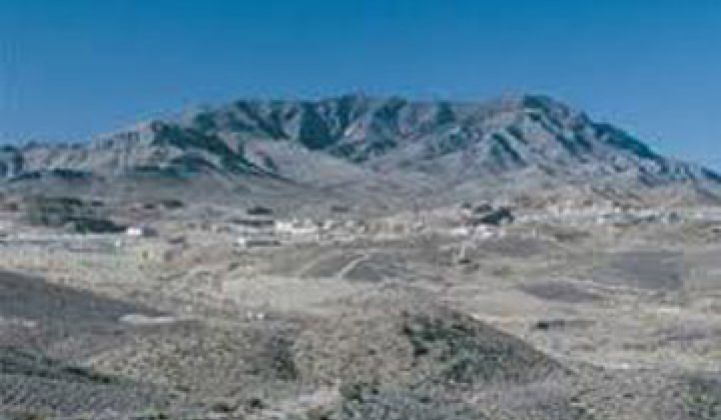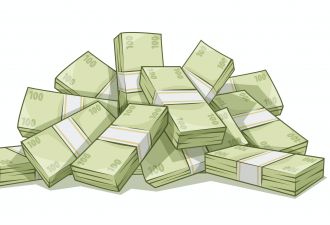A year ago, Molycorp was a company with IPO plans that interested few.
Now it's on its way to becoming a conglomerate in rare earth materials.
The company today said that it would buy Santoku America, a subsidiary of a Japanese company, through one of its own subsidiaries, called Molycorp Minerals, for $17 million. Molycorp proper owns the Mountain Pass, California mine, which contains one of the richest stores of rare earth minerals outside of China. (See picture.) Molycorp Minerals will take the raw materials from the mine to produce finished materials for neodymium iron boron magnets, the high-powered magnets that go inside wind turbines and other electrical equipment.
Earlier in the month, Molycorp bought Estonia's AS Silmet, which also converts raw materials into rare earth minerals for finished products, for $89 million. Late last year, Molycorp also struck a deal with Hitachi: in exchange for giving Hitachi the right to buy minerals from its mine, Hitachi agreed to set up a joint venture with Molycorp in the U.S. to manufacture magnets.
So in a few short months, the company has gone from owning a closed mine, to becoming a minerals processor on two continents armed with a strategic plan to build products from those minerals. In turn, manufacturing will help insulate the company from the terrific mood swings and price fluctuations that come with being a producer of commodities.
The company is certainly one of the great melodramas in greentech. Back in 2008, Chevron spun off the Mountain Pass mine to Molycorp for $80 million. Molycorp held an IPO last year and has since seen its stock climb from $13 a share to more than $75. The company itself is now worth over $6 billion. Savor the irony.
The insane increase in the value of Molycorp derives from a worldwide panic over the price and availability of rare earth minerals. Worldwide demand for rare earth minerals comes to around 50,000 to 55,000 tons a year, according to Mark Smith, Molycorp CEO, and China produces close to 97 percent of the total. In 2009, China's export quotas sat at approximately 50,000 tons. In 2010, China dropped it to 30,000 tons and will cut it this year to 24,000 tons. As a result, the price for some rare earth oxides such as neodymium oxide have risen from $20,000 a ton in 2009 to $165,000 a ton, according to our own spot checks. Molycorp's stock limped around $13, near the IPO price, for weeks -- until the Chinese policy took effect.
“This is an immediate concern,” Smith said last November. “A lot of people we are signing long-term agreements with are very tired of not knowing day to day. You have no idea what to expect.”
Demand, moreover, is slated to continue to rise. A 2.5-megawatt wind turbine contains approximately 4,000 pounds of magnets. Rare earth materials account for one-third of the weight of those magnets. LCD TVs and medical imaging equipment rely on rare earths, too.
Electric cars contain around 10 pounds of rare earth materials. Even if China shifts from exporting raw rare earth materials to finished goods containing rare earths, domestic consumption will invariably curb total exports to the West. I think the company should send China's Premier a fruit basket or something.
The Mountain Pass mine in California contains ores with an average grade of 8.24 percent rare earth content. That’s the second richest average ore grade in the world, Smith asserted. The mine also contains one of the largest deposits in the world.
Of course, what goes up can come down. A reversal of policy in China could bring the stock price way down. Other companies are also exploring defunct rare earth sites in Australia. The Mountain Pass mine, meanwhile, is not yet operational, and it may take close to $100 million in upgrades and updates to reopen it. By the end of 2012, the company hopes to be producing 20,000 tons of rare earth oxides a year.



